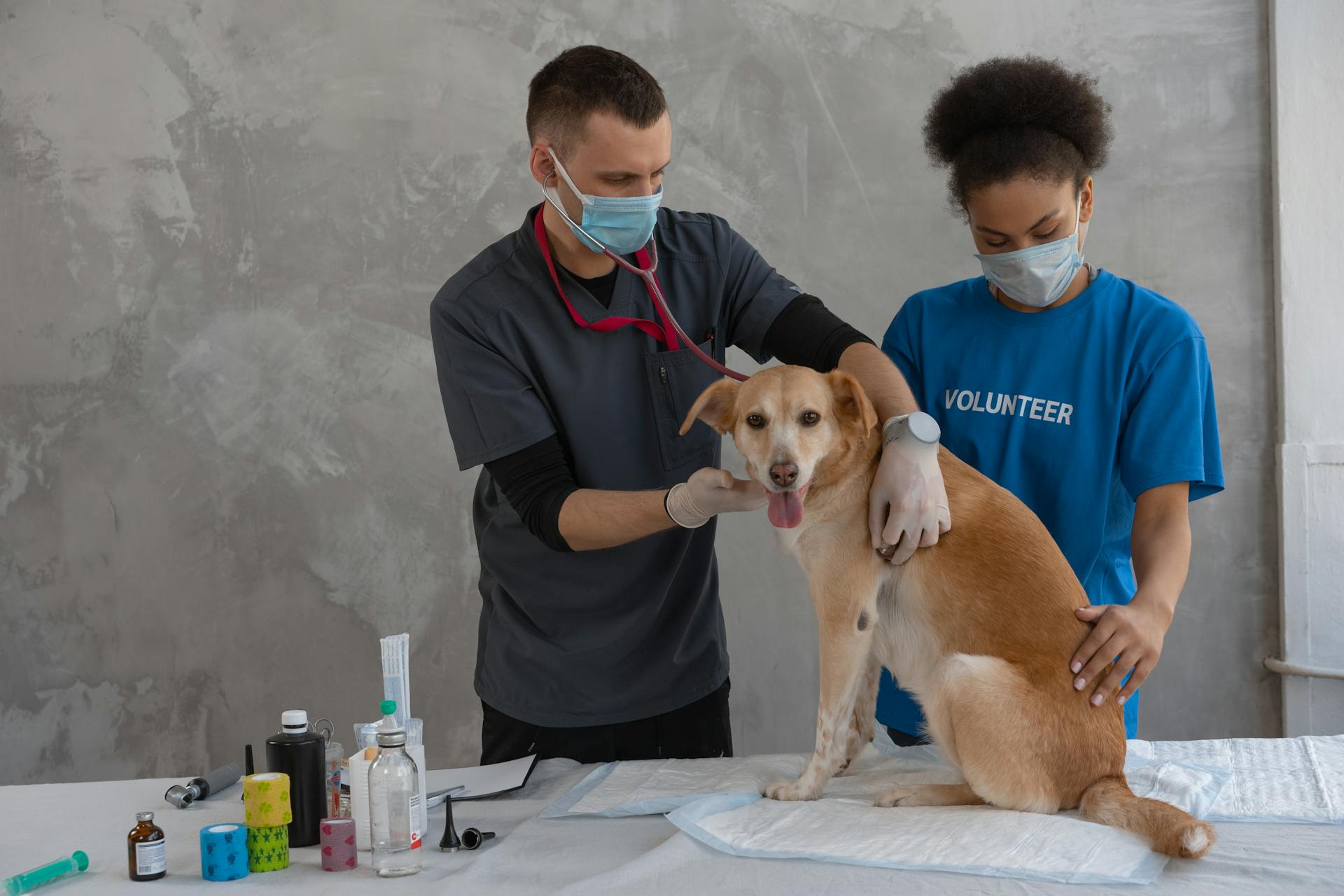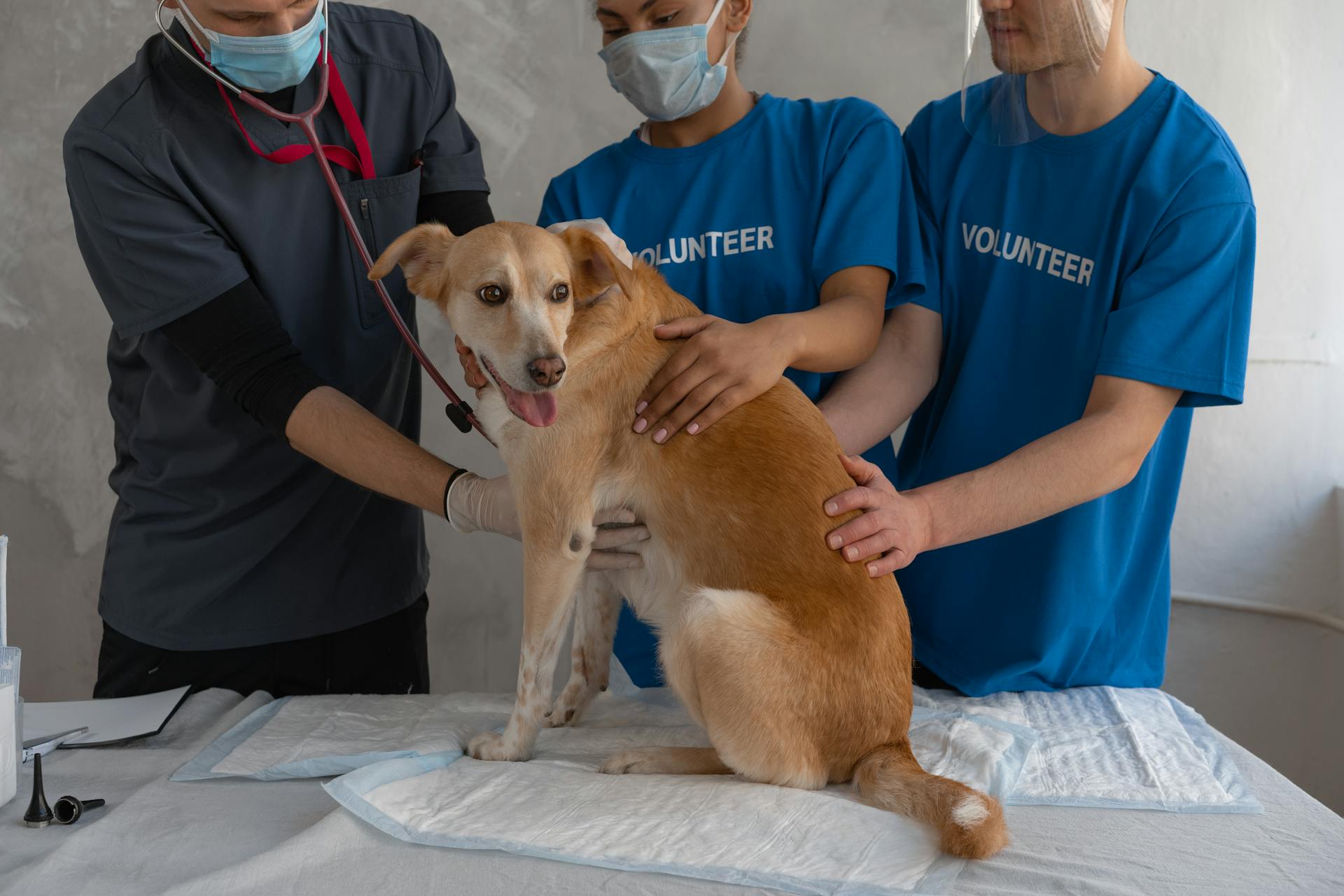
Pancreatitis in dogs is a painful and potentially life-threatening condition that requires prompt attention. Pancreatitis occurs when the pancreas becomes inflamed, often due to a high-fat diet.
Dogs with pancreatitis often experience vomiting and diarrhea, which can lead to dehydration and electrolyte imbalances. Pancreatitis can be acute or chronic, with acute pancreatitis being more common in dogs.
The pancreas plays a crucial role in digestion and glucose regulation, making pancreatitis a serious condition that needs to be treated promptly.
What You Need to Know
Pancreatitis in dogs can be a real challenge, but there are some things you should know to help your furry friend feel better.
The severity of pancreatitis can vary from mild to severe, with some dogs experiencing only mild symptoms while others may require hospitalization.
You'll want to work closely with your veterinarian to develop a treatment plan that's tailored to your dog's specific needs.
The goal of treatment is to manage the pain and inflammation, and to prevent further episodes of pancreatitis.
Related reading: Pancreatitis in Dogs Treatment Cost
Pain management is a crucial part of treating pancreatitis, and your veterinarian may prescribe medication to help alleviate your dog's discomfort.
Anti-inflammatory medications can also be used to reduce inflammation and swelling in the pancreas.
Some dogs may require hospitalization to receive around-the-clock care and monitoring.
In severe cases, surgery may be necessary to remove any damaged tissue or to relieve blockages in the pancreas or bile duct.
By understanding what's happening with your dog's pancreas, you'll be better equipped to provide the care and support they need to recover.
Causes and Pathophysiology
Causes of pancreatitis in dogs are not always easy to pinpoint, but some underlying causes are known to contribute to the condition. Several veterinary medications have been linked to pancreatitis, and high-fat content in a dog's diet can also trigger the condition.
Dietary indiscretion, which can include eating spoiled or fatty foods, is a common cause of pancreatitis in dogs. Some toxins, such as zinc and castor beans, can also cause the condition. In addition, pancreatic ischemia, surgical manipulation, and diseases affecting the biliary, pancreatic duct, and intestinal systems can all contribute to pancreatitis.
The inciting cause of pancreatitis may be idiopathic, meaning the underlying cause is unknown. However, understanding the possible causes can help pet owners and veterinarians work together to prevent and manage the condition.
See what others are reading: What Foods Cause Pancreatitis in Dogs
Causes

Causes of pancreatitis are complex and not yet fully understood. Underlying causes are still poorly understood, making diagnosis and treatment challenging.
Some veterinary medications have been linked to pancreatitis, so it's essential to monitor your pet's medication use. Several veterinary medications have been implicated to cause pancreatitis.
Dietary indiscretion, especially high-fat content, can trigger pancreatitis. Dietary indiscretion (± high-fat content) and some toxins (eg, zinc, castor beans) are generally accepted causes.
Other potential causes include pancreatic ischemia, which can result from hypotension due to fluid loss or anesthesia. Pancreatic ischemia (result of hypotension from fluid loss or anesthesia) is one such cause.
The inciting cause of pancreatitis may be idiopathic, meaning it's of unknown origin. The inciting cause may be idiopathic.
Here's an interesting read: Dog Food for High Energy Dogs
Pathophysiology
The pathophysiology of this condition is a complex process that involves the activation of potent pancreatic enzymes. These enzymes are normally stored in an inactive form called zymogens in the endoplasmic reticulum.
In healthy states, these enzymes are safely stored and segregated, but when they're activated, they can cause significant inflammation. This inflammation can have local and systemic consequences.
Severe cases can lead to devastating effects, including systemic inflammatory response syndrome (SIRS). SIRS can cause a range of symptoms, including respiratory difficulty, renal injury, and coagulopathic disease.
Some of the specific systemic consequences of this condition include:
- Focal or diffuse peritonitis
- Respiratory difficulty (e.g. acute respiratory distress syndrome [ARDS])
- Renal injury
- Hepatobiliary dysfunction
- Coagulopathic disease (e.g. disseminated intravascular coagulation [DIC])
Diagnosis and Treatment
Diagnosis and treatment of pancreatitis in dogs are crucial for providing effective pain relief. Prompt diagnosis is essential, as pancreatitis can progress quickly and become painful for some dogs.
The sooner you have a diagnosis, the sooner your dog can begin treatment. Bring symptoms of pancreatitis to your veterinarian's attention as soon as possible.
Several diagnostic tools may be used to diagnose pancreatitis, including the specific canine pancreatic lipase (SPEC cPL) test, which detects 83% of cases. Ultrasound may also be used, though it only detects about 68% of cases.
Broaden your view: Canine Pancreatitis Home Remedies
Abdominal X-rays aren't particularly helpful in diagnosing pancreatitis, but they may be used to rule out other causes of disease. A physical exam and laboratory testing will help your veterinarian make a diagnosis and recommend a treatment plan.
Treatment for pancreatitis typically involves supportive care, such as intravenous fluid and electrolyte support, pain medications, and antinausea medication(s). A bland, low-fat diet is also recommended during recovery, which may be a home-cooked and/or home-prepared diet.
The cost of treating pancreatitis varies based on severity, ranging from $500 to $5,000. Hospitalization may be required for dogs with severe pancreatitis, while mild cases may be treated on an outpatient basis.
A permanent diet change may be recommended, especially in predisposed breeds or dogs with a history of pancreatitis. With treatment and dietary modification, many dogs do recover from pancreatitis, but it won't be fully cured – the condition can always come back.
Here are some common treatment options for pancreatitis:
- Intravenous (IV) fluid and electrolyte support
- Pain medications
- Antinausea medication(s)
- Stomach-protectant medications
- Nutritional support in the form of a feeding tube
- Appetite stimulants
- Antibiotics (sometimes)
- Immunosuppressants (in chronic cases)
Treatment Options
Treatment of pancreatitis in dogs is primarily supportive care, regardless of whether the patient has acute or chronic pancreatitis.
Intravenous (IV) fluid and electrolyte support is often necessary to help manage dehydration and electrolyte imbalances.
Pain medications are a crucial part of pancreatitis treatment to help manage discomfort and pain.
Antinausea medication(s) can be prescribed to help alleviate vomiting and nausea.
Stomach-protectant medications may be recommended to prevent stomach ulcers and bleeding.
Nutritional support in the form of a feeding tube is often necessary to help manage weight loss and malnutrition.
Appetite stimulants can be used to help increase a dog's appetite and encourage eating.
Antibiotics may be prescribed in some cases to help prevent or treat secondary infections.
Immunosuppressants may be used in chronic cases to help manage inflammation and prevent further complications.
A bland, low-fat diet is recommended during recovery, which may be a home-cooked and/or home-prepared diet.
The cost of treating pancreatitis varies based on severity, ranging from $500 to $5,000.
A permanent diet change may be recommended, especially in predisposed breeds or dogs with a history of pancreatitis.
If this caught your attention, see: Are Emotional Support Animals Service Dogs
Recovery and Management
The recovery process for dogs with pancreatitis is a crucial step in ensuring their comfort and well-being.
A dog's prognosis depends on the severity of the illness, with severe cases having a poor to grave overall prognosis.
Patients with mild pancreatitis generally recover within a week or two, but it's essential to follow your veterinarian's instructions closely for prescription medications.
Providing a quiet space for your dog to rest in can help them recover more comfortably.
Some dogs may experience multiple bouts of mild pancreatitis during their lives, which can be managed with a strict low-fat diet and monitoring of concurrent health issues.
A low-fat diet, such as Royal Canin Gastrointestinal Low Fat dog food, can be beneficial for dogs with recurrent pancreatitis.
Scarring of the pancreas can lead to the development of diabetes mellitus and/or exocrine pancreatic insufficiency (EPI) in dogs that have recovered from a single episode of pancreatitis.
Early diagnosis and treatment are crucial for a better chance of recovery in dogs with pancreatitis.
Dogs with pancreatitis should be assumed to have some level of abdominal pain or discomfort, even if they don't show overt signs.
Opioid analgesics are the mainstay of pain management in dogs with pancreatitis, and full μ opioid agonists like methadone or fentanyl are considered the most effective.
Signs and Symptoms
Dogs with pancreatitis can exhibit a range of signs and symptoms, making it crucial to recognize the warning signs early on.
A lack of appetite is one of the most common signs of pancreatitis in dogs, and if left untreated, it can worsen quickly.
Dogs with worsening pancreatitis are often severely dehydrated, lethargic, and weak, and in pain.
Dehydration is a significant concern, as it can lead to shock or sudden collapse, which is a life-threatening situation.
Severe vomiting is another red flag, as it can cause dehydration and electrolyte imbalances.
Dogs with pancreatitis may also exhibit abdominal pain, which can range from mild to severe.
Here are some common signs of pancreatitis in dogs:
- Lack of appetite
- Dehydration
- Hunched back
- Vomiting
- Distended abdomen
- Diarrhea
- General discomfort
- Fever
- Abdominal pain
In severe cases, dogs may exhibit irregular heartbeat, shock, severe depression, sepsis, or difficulty breathing.
It's essential to seek veterinary care immediately if your dog is experiencing these symptoms, as timely treatment can greatly improve their chances of recovery.
Frequently Asked Questions
Is severe pancreatitis in dogs painful?
Yes, pancreatitis in dogs can be extremely painful, with both acute and chronic forms causing significant discomfort. If your dog is experiencing pancreatitis symptoms, seek veterinary care immediately to prevent complications.
Does gabapentin help with pancreatitis pain in dogs?
Gabapentin is one of the medications that may be used to help manage pain in dogs with pancreatitis. It's often used in combination with other pain relief options to provide effective pain management.
Sources
- https://www.petmd.com/dog/conditions/endocrine/pancreatitis-in-dogs
- https://www.dvm360.com/view/management-of-pancreatitis-in-dogs-and-the-role-of-panoquell-ca1-fuzapladib-sodium-for-injection-
- https://www.cliniciansbrief.com/article/canine-pancreatitis-complete-guide
- https://www.thefarmersdog.com/digest/pancreatitis-in-dogs/
- https://peterdobias.com/blogs/blog/pancreatitis-in-dogs-treatment-at-home
Featured Images: pexels.com


